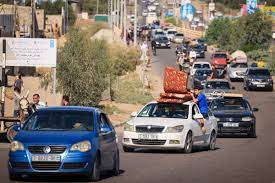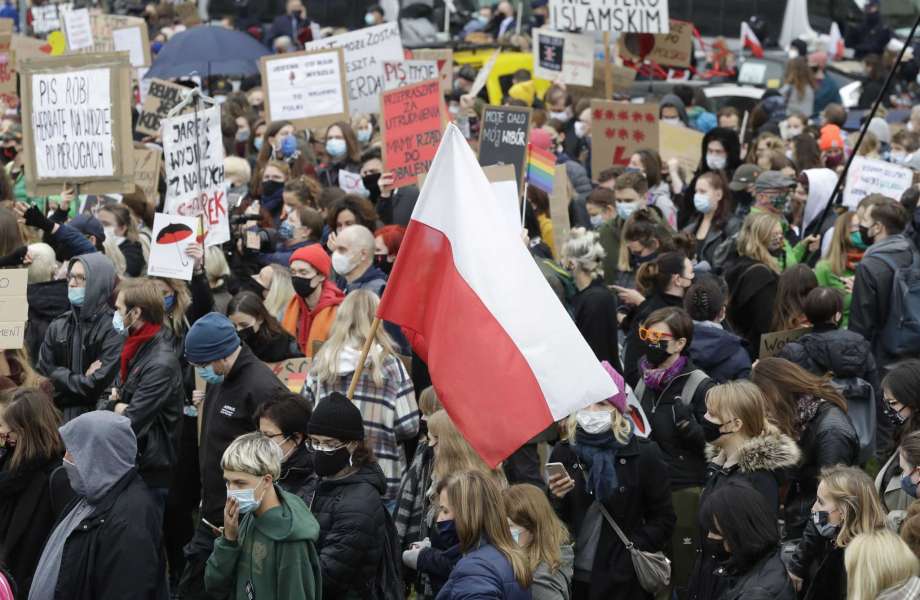One Million Gazans Displaced As Israel Readies For Ground Attack- UN
The United Nations on Sunday, said more than one million people have been displaced in the Gaza Strip in the last week after the sustained Israeli bombardment and warnings about a ground attack against Hamas commanders.
Israel declared war on the Islamist group last Sunday, a day after waves of fighters broke through the heavily fortified border and shot, stabbed and burned to death more than 1,400, most of them civilians.
Seven days of relentless bombing targeting those who masterminded the attack have left more than 2,300 people dead, the majority ordinary Palestinians.
But even as Israel seeks to avenge the worst attack in its history, it faced a grave warning about the security implications of putting boots on the ground in the densely populated enclave.
“No one can guarantee the control of the situation and the non-expansion of the conflicts” if Israel sends its soldiers into Gaza, said Iran’s foreign minister Hossein Amir-Abdollahian.
“Those who are interested in preventing the scope of war and crisis from expanding need to prevent the current barbaric attacks… against citizens and civilians in Gaza,” he added.
Iran is Israel’s number one enemy and as well as funding Hamas also backs Hezbollah in Lebanon to the north, where cross-border fire has intensified in the last week.
At least 10 people have now been killed in Lebanon and two in Israel, prompting Israel to shut the border area to civilians.
Iran has praised the Hamas attacks but insisted it was not involved. However, the United States, which has sent two aircraft carriers to the eastern Mediterranean in a show of support for Israel, is wary.
In Washington, White House National Security Adviser Jake Sullivan said the United States feared an escalation, particularly the prospect of Iran becoming “directly engaged”.
US Secretary of State Antony Blinken has in recent days toured Middle Eastern capitals in a frantic round of diplomacy to try to avert a wider crisis in the volatile region.
He is due back in Israel on Monday for further talks with Israeli leaders, the State Department said as he arrived in Cairo.
Blinken has appealed to China to use its influence in the region to ease tensions.
But on Sunday Foreign Minister Wang Yi said Israel’s response had “gone beyond the scope of self-defence”.
He called on Prime Minister Benjamin Netanyahu and his emergency government to “cease its collective punishment of the people of Gaza”.
Evacuations
Israel has massed thousands of troops and heavy weaponry in the desert south of the country, waiting for the green light to go into northern Gaza.
The army has told 1.1 million Palestinians in the north of the Gaza Strip — nearly half of its 2.4-million population — to head south to safety.
On the other side of the border, Israelis were moving to safer areas.
Military spokesmen Lieutenant Richard Hecht and Daniel Hagari said any ground offensive would be triggered by a “political decision”.
Netanyahu visited frontline troops on Saturday, telling them “more is coming” but without specifying when any ground operation would start.
Hecht singled out Yahya Sinwar, the chief of Hamas in Gaza blamed for the October 7 attacks, calling him “a dead man walking”.
Aid agencies, including the UN and ICRC, as well as foreign governments have repeatedly criticised Israel’s request for Gazans to leave their homes – and accused it of inflicting collective punishment on ordinary people.
The UN agency supporting Palestinian refugees on Sunday stated that some one million people had already been displaced in the first week of the conflict.
“The number is likely to be higher as people continue to leave their homes,” UNRWA director of communications Juliette Touma told AFP.
Palestinians carrying whatever belongings they can, in bags and suitcases, or packed onto three-wheeled motorbikes, battered cars, vans and even donkey carts have become a common sight in recent days.
But they have had to find shelter wherever they can in the increasingly crowded south of the Gaza Strip, including in the streets and UN-run schools.





